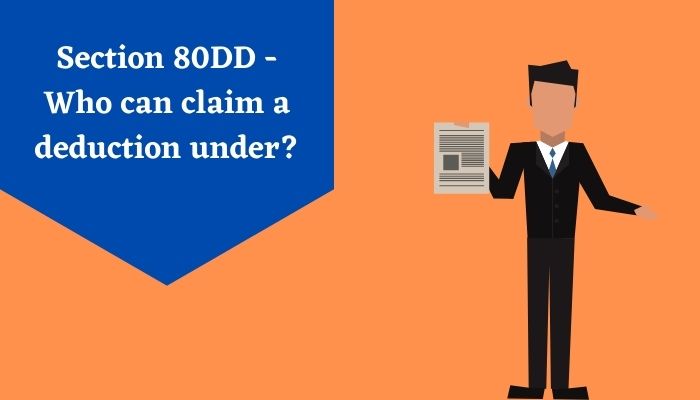Section 80DD – Who can claim a deduction under?
All Indian residents are eligible for claiming tax deductions under Section 80DD of the Income Tax Act, 1961. To claim deductions under this section, one must have the necessary medical certificates, medicine bills, and all other supportive documents.
This section can provide a great amount of relief to individuals who are burdened with the rising costs of medical treatments. These deductions are specifically helpful for the lower and middle states of Indian society.
This deduction can provide relief to a group of people who are dependent on disability or suffer from severe disabilities. Before we move any further, it is important to remember that income tax has changes in rates and minor amendments but the legal and relief aspect is still based on the Income Tax Act that was rolled out in 1961.
The Eligibility for Claiming Deduction Under Section 80DD
To be eligible for the claim deduction under Section 80DD of the Income Tax Act, one must:
- Be an individual or a member of a Hindu Undivided Family (HUF) who is also a resident of India
- Must not be a non-resident Indian (NRI). This is mainly because a lot of countries like Canada largely help their residents when it comes to getting high-quality medical treatments
There are also some expenses that are exempted from income tax under Section 80DD. These expenses are:
- Any expenses incurred for medical treatment that includes nursing, training of dependent that is disabled, or rehabilitation of dependent that is disabled
- The amount paid towards Life Insurance Corporation (LIC), Unit Trust of India, or any other insurer for the sole purpose of purchasing specific schemes or insurance policies that help with the maintenance of a dependent with disabilities
To fully comprehend the deductions that are applicable under Section 80DD, individuals must also be familiar with the meaning of disabled dependent. This meaning should be according to the Indian Income Tax Laws.
If an individual falls under the following circumstances, then he or she is eligible to be called a disabled dependent under Section 80DD. This further means that the person’s caretaker can avail of the income deductions in the following cases.
- Individuals, spouse, son, daughter, any child, parents, brother, or sister can be considered as a disabled dependent for an individual
- This is also applicable for any Hindu Undivided Family. This means that any member of the HUF can be a disabled dependent
- It is vital that the disabled individual should be wholly or mostly dependent on the taxpayer for their support as well as maintenance
- He or she should also not claim the deduction under Section 80U
What Kind of Disability or Severe Disability is Considered Under Section 80DD?
The disabilities that are considered under Section 80DD of the Income Tax Act are:
- Cognitive or severe mental disabilities
- Low vision
- Blindness
- Leprosy cured
- Hearing impairment
- Locomotor disability
- Mental illness
- Autism
- Cerebral palsy
- Multiple disabilities
It is vital to note that individuals must not suffer less than 40% of any of the above disabilities. When it comes to severe disability, then 80% or above of one or more of the mentioned illnesses or disabilities are considered.
Factors Related to Claiming Deduction Under Section 80DD
Apart from this, one should remember that a medical certificate is necessary if one wishes to claim a deduction with respect to the disabilities that are mentioned above. This certificate should be obtained from a government hospital. The document should certify the disability of the dependent and the person that he or she is dependent on. The certificate should also be renewed periodically.
If an individual is suffering from Autism, Cerebral Palsy, or other multiple disabilities, then he or she should fill out form number 10-IA and submit it. Individuals also have to submit a self-declaration, which should be signed to certify the expenses incurred related to medical treatments, including nursing, rehabilitation, as well as training of a disabled dependent.
One should remember that individuals do not have to preserve the actual receipts of the expenses related to the disabled dependants. But the actual receipts have to be submitted in case the claim deduction with respect to the payment made to any insurer like UTI, LIC, and others. This is for the purpose of getting insurance plans and schemes for the maintenance of the disabled dependent.
Apart from all this, it should be noted that the medical certificate should be made by an individual with the following credentials for it to be considered valid.
- A civil surgeon or a Chief Medical Officer (CMO) of a government hospital
- A neurologist with a Doctor of Medicine (MD) degree in Neurology or a Pediatric Neurologist with a similar degree for children
Tax Deduction Under Section 80DD for Disabled Dependants
The income tax deduction that is allowed under Section 80DD is up to a maximum of INR 50,000 for disabled dependent individuals. This limit was increased to a value of INR 75,000 in 2016.
For severely disabled dependents, this limit is up to a maximum of INR 50,000. In the year 2016, this limit was increased to INR 1,25,000. It should also be noted that the deduction is not dependent on the number of expenses that were incurred.





























